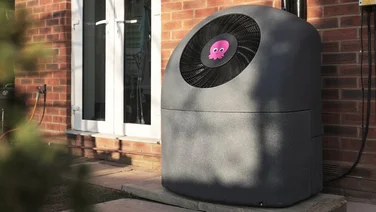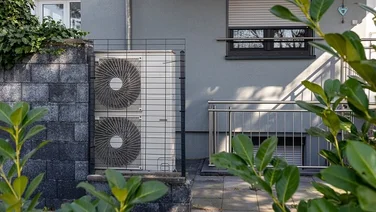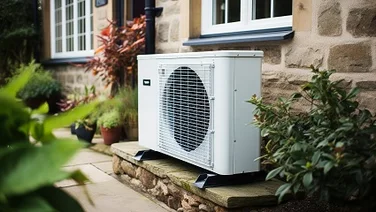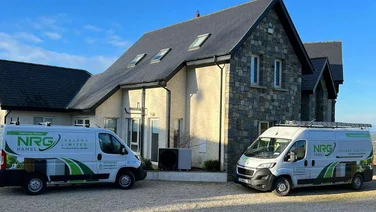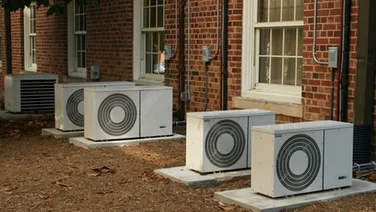✔ The average UK home could save 1,404 kg of CO2 a year with a heat pump
✔ If replacing an old gas boiler, you could save as much as 2,900 kg of CO2 a year
✔ More than 217,000 heat pumps have been installed in the UK so far
The government is encouraging UK households to install heat pumps as part of its Net Zero strategy for reducing emissions.
Unlike traditional gas boilers, heat pumps are powered by electricity, extracting heat from outside and transferring it into your home. This means that they don’t burn fossil fuels.
What type of central heating do you currently use?
Get startedWith the price of gas forecast to increase in the long term, the rise in renewable energy production should see electricity costs come down, which makes heat pumps a sound investment in the long term.
That being said, there are significant costs to consider when investing in a heat pump. That’s why the government has set up several grants to help with heat pump costs, including the Boiler Upgrade Scheme.
So, how much would a heat pump really reduce your carbon footprint? Let’s take a look.

Are heat pumps a carbon-free source of heating?
Strictly speaking, heat pumps are not a carbon-free source of heating, but they are considered to be a form of low-carbon heating.
They work by drawing residual heat from the natural environment, and using electricity to transfer that heat to your home’s heating network.
So why aren’t they carbon-free if they don’t burn fossil fuels? Because they run on electricity, and not all electricity produced in the UK comes from renewable sources, so heat pumps are still responsible, indirectly, for some emissions.
Luckily, they don’t use a whole lot of electricity. A heat pump’s efficiency is around three times that of a traditional boiler, which means they use around three times less energy to produce the same amount of heat.
That makes them one of the most environmentally friendly forms of heating, and also means they’re cheaper to run than an electric boiler.
How much CO2 could you save with a heat pump?
The average three-bedroom home in the UK could save 1,404 kilograms (kg) of CO2 a year by switching from a gas boiler to a heat pump, according to British Gas’s Carbon Cruncher tool.
Property size | CO2 savings compared to gas boiler |
|---|---|
1-2 bedrooms | 936 kg |
3 bedrooms | 1,404 kg |
4-5 bedrooms | 1,989 kg |
How much CO2 you save will vary depending on how much energy you use, the type of heating system you’re switching from, the efficiency of your old system and that of your new heat pump.
The Energy Saving Trust (EST), for example, has a more generous estimate of CO2 savings. They’ve calculated that the average three-bedroom home will save 1,900 kg a year with a heat pump compared to a new gas boiler, and 2,900 kg compared to an old gas boiler.
If you want to know what’s better overall, heat pumps or gas boilers, go to our page for the full comparison.

How much CO2 could the UK save if all households had heat pumps?
If all of the UK’s 28.2 million households had a heat pump instead of a gas boiler, the UK could save around 53.58 million tonnes of CO2 a year.
That’s an impressive 16% decrease from 330 million tonnes of CO2 the UK currently produces annually. It’s not more because most of the UK’s emissions come from other activities, such as industrial work, transport, and imports and exports.
It’s also a hypothetical number since not all UK households currently use a gas boiler to heat their homes.
Around 3% of households in England and Wales still use oil boilers, for example, which have higher emissions than gas boilers, and of course, plenty of households have already switched to a heat pump.
How many heat pumps are there in the UK?
As of the start of 2024, there have been more than 217,000 heat pump installations in the UK, according to the latest Microgeneration Certification Scheme data.
The government set a target of having 600,000 households with heat pumps by 2028. To achieve this, the rate of heat pump installations would need to increase tenfold, since only 39,000 heat pump installations were carried out in 2023.
Can you save money with a heat pump?
You can save money with a heat pump, on top of CO2 emissions, but how much you save depends on your current heating system.
If you’re switching to a heat pump from a gas boiler, you’ll have to wait a while before seeing any savings.
At the moment, electricity costs more than gas, so even though they use three times less energy than boilers, heat pumps cost £256 more to run per year.
The reason you can expect savings in the long run is because the price of electricity is forecasted to fall in the coming years, and the price of gas to rise, as the world transitions away from fossil fuels.
This means that over its 20-year lifespan, the average air source heat pump can save you £4,891 over a gas boiler.
If you’re switching to a heat pump from an eclectic boiler or an oil boiler, you’ll see savings immediately. Heat pumps cost £593 less to run a year than an electric boiler, and £289 less than an oil boiler.
Next steps
Heat pumps can make a dent in your annual carbon emissions, and save you money over time.
Unfortunately, they cost £10,000 to buy and install on average, a price many of us can’t, or aren’t willing to pay.
But don’t worry, if you apply for the Boiler Upgrade Scheme, you can £7,500 off a heat pump, bringing the set-up costs more in line with a gas boiler.
If you’re interested in getting a heat pump, we can help connect you with an installer. Just fill in our short form, and someone will be in touch with quotes.

